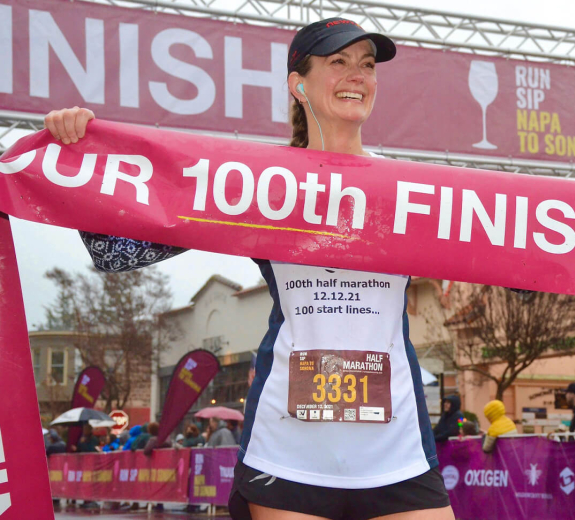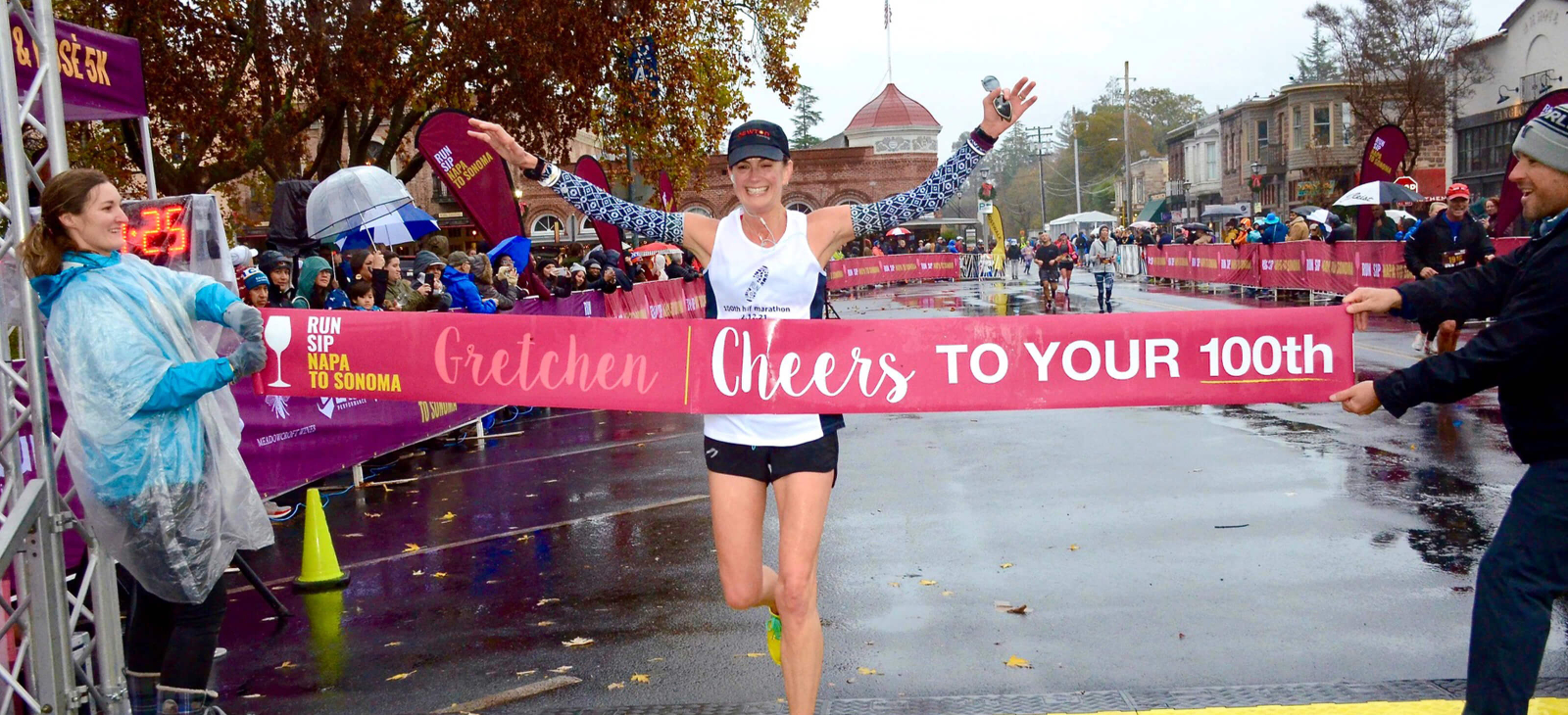
One Pandemic, Three Autoimmune Diseases and 100 Half Marathons
Rain was pouring down on the morning of Gretchen Schoenstein’s 100th half marathon — a day she’d dreamt of but wasn’t sure would ever come. That morning, the event’s producer asked her to share a few words.
“I told the crowd that my motto is ‘every step is a gift, every mile is an accomplishment, every finish line is a victory,’” she says. “And I said I am one of the 25 million Americans living with autoimmune disease. These diseases — multiple sclerosis, type 1 diabetes, rheumatoid arthritis — they’re all connected and they have no cure. But there’s hope. I told them about Benaroya Research Institute (BRI), where there’s an incredible team working to find a cure.”
Gretchen’s goal of running 100 half marathons in 10 years started with doctors telling her what she couldn’t do and ended with her realizing how capable she was. Along the way, she raised thousands of dollars for autoimmune disease research at BRI. She faced the fear that comes with living with a lung condition in the time of COVID-19. She went through challenges in training and worked to accept that the pandemic had changed things forever. And in December 2021, she laced up for half marathon number 100.
“Throughout the race, I just kept thinking of this sign that says ‘there will be a day when you cannot do this. But today is not that day,’” Gretchen says.
100 half marathons in 10 years
Gretchen’s path to 100 half marathons started after she was diagnosed with her third autoimmune disease, sarcoidosis, which affects the lungs and the joints. Her doctors told her she’d probably never run again. She spent the next three years living with extreme caution — then she decided to prove her doctors wrong.
She ran her first half marathon in 2010, then four more that year. This ultimately shaped her goal of running 100 half marathons in ten years. She crossed finish line after finish line, using races to rally support for autoimmune disease research through an organization called Operation Shooting Star and donating funds to BRI’s research.
In February 2020, Gretchen ran race number 89. Then the pandemic hit.
A dream deferred
Race after race was canceled. The virus loomed outside Gretchen’s door.
“One of the long-term effects of sarcoidosis is lung damage,” Gretchen says. “I don’t trust how my body would respond if I got COVID. I was terrified.”
Fear of contracting the virus and stress from the pandemic ultimately led Gretchen to take a four-month break from running. But eventually, as more was learned about the virus, she started to feel safer about running outside and distanced from others.
Slowly, she started running again. She set small goals, running a mile a day or a few times per week. Then she set a bigger goal: Complete one 13.1-mile run, the length of a half marathon, by the end of 2020.
“I tend to procrastinate, so I did it on New Year's Eve,” Gretchen says. “There was no fanfare, no real finish line except the one I created in my mind. But it absolutely felt like a victory.”
Still, it wasn’t easy to step back into her pre-pandemic running routine, especially with races still on hold.
“I was coming to terms with the fact I was never going to be the same runner I was before the pandemic. I had to find a way to be okay with that,” she says. “Around then, I saw several interviews with Olympians talking about their deferred dreams when the Olympics were delayed, and what it took to stay in shape. It made me think that maybe I could still do this, even if it was different than what I had initially imagined.”
Races started to come back that summer. Gretchen signed up for half marathon number 90.
“I crossed that finish line and I lost it,” she says. “I was like ‘oh my god, this is who I am.’ I never intended to do 10 more in four months, but that race absolutely lit a spark in me.”

Magic beyond the fear
In November 2021, Gretchen ran race 99 in Seattle.
“Remind me to never run a race three days after Thanksgiving again, I felt like I was still digesting,” she says with a laugh.
In December 2021, she laced up for number 100 in her hometown, Sonoma, California. Each of the last five miles, she walked for one minute to take it all in.
“Mile 11 was the most emotional,” she says. “I had this overwhelming moment of feeling my dad there with me. He had colitis. He was an athlete and he died of brain cancer years ago. I felt that I was doing this for him and for all the people who couldn’t.”
As she neared the finish line, she saw her friends and family with finish line tape that read “Gretchen, cheers to your 100th!”
“It was just this moment of realizing everything that had led to this. I felt the weight of COVID which has scared the heck out of anybody who has a respiratory issue,” she says. “And I felt the magic beyond that fear.”
Every step counts. The small steps build up to something bigger and you see it pay off. In those moments, you realize that you're more capable than you thought, more capable than your diagnosis.
After race 100, Gretchen is formulating new goals, including brainstorming new fundraisers for autoimmune disease research. She has some advice for people living with autoimmune disease and for anyone navigating the pandemic’s ups and downs.
“The uncertainty is the hardest part,” she says. “But it's about finding balance between that uncertainty and fear and grounding yourself in what you know you can do. Every step counts. The small steps build up to something bigger and you see it pay off. In those moments, you realize that you're more capable than you thought, more capable than your diagnosis. And you can get through it and you can do more than you ever thought you could. And there's something invigorating and profoundly powerful in that.”
Immuno-what? Hear the latest from BRI
Keep up to date on our latest research, new clinical trials and exciting publications.


